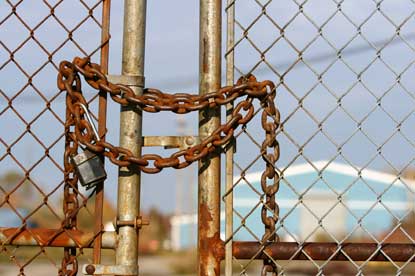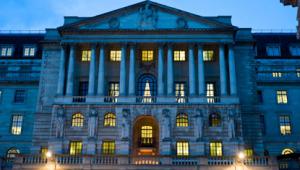By Vivienne Russell | 25 January 2013
The UK economy contracted by 0.3% in the last three months of 2012, threatening to push the country into a triple-dip recession, the Office for National Statistics revealed today.
 The contraction is the fourth recorded in the past five quarters and was driven largely by a slump in production, which fell by 1.8% on the previous quarter. Construction registered a small increase (0.3%) compared with the previous three months but the service sector remained flat. Compared with the fourth quarter of 2011, gross domestic product has flatlined.
The contraction is the fourth recorded in the past five quarters and was driven largely by a slump in production, which fell by 1.8% on the previous quarter. Construction registered a small increase (0.3%) compared with the previous three months but the service sector remained flat. Compared with the fourth quarter of 2011, gross domestic product has flatlined.The latest contraction follows 1% growth in the third quarter, which lifted the UK out of double-dip recession.
Chancellor George Osborne said the figures were a reminder that the country faced a very difficult economic situation, both at home and abroad.
‘We face problems at home with debts built up over many years and problems abroad with the eurozone, where we export many of our products, deep in recession,’ he told the BBC.
‘We can either run away from those problems, or confront them. And I'm determined to confront them so we go on creating jobs for the people of this country.’
Azad Zangana, chief European economist at asset management company Schroders, said the figures were worse than the City had expected.
‘Part of the negative hit to growth was caused by an Olympics hangover, where the boost seen in the third quarter disappeared,’ he said.
‘This should be seen as a one-off hit to the economy. However, now that a negative GDP figure has been recorded, there is a significant risk that the UK economy suffers a triple-dip recession. Weak underlying economic activity coupled with the disruption of recent poor weather could cause GDP to fall in the first quarter of 2013.’
Institute for Public Policy Research chief economist Tony Dolphin said the economy was facing a ‘triple crisis’ of stagnation, debt and imbalance, adding that the government’s efforts to reduce its borrowing were becoming ‘self-defeating’.
He said: ‘As a first step to get back on track, we need a temporary cut in employees’ National Insurance contributions, using the historically low cost of borrowing to increase spending on infrastructure, measures to keep the long-term unemployed in touch with the labour market and an active industrial policy focused specifically on reversing the country’s poor export performance.’
Trades Union Congress general secretary Frances O’Grady said the coalition government’s economic strategy had been a ‘complete disaster’.
She said: ‘The chancellor now has all the evidence he needs to change course and focus instead on investment and growth. If he refuses to listen, he could do even more permanent damage to the economy.’
The figures come the day after Olivier Blanchard, chief economist at the International Monetary Fund, suggested that Osborne consider slackening off the pace of austerity. Earlier in the week the IMF cut its 2013 growth forecast for the UK to 1%, from the 1.1% it predicted in October.
Deputy Prime Minister Nick Clegg has also acknowledged that the coalition’s decision to cut capital investment when it first took office was mistaken.
‘I think we've all realised that you actually need, in order to foster a recovery, to try to mobilise as much public and private capital into infrastructure as possible,’ he said in an interview with The House magazine.






















